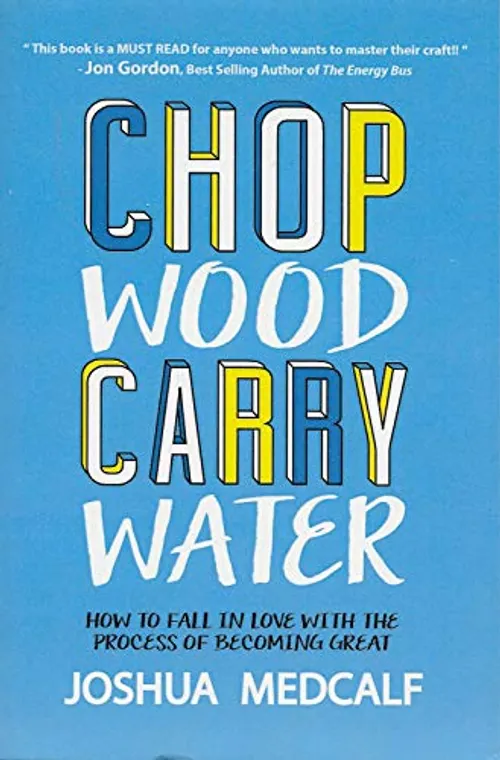
Chop Wood, Carry Water teaches that greatness is built through discipline, humility, and consistency. Joshua Medcalf shares lessons from sports, business, and life to show that success comes not from talent, but from doing the basics well—every single day. This book challenges you to embrace hard work, serve others, and build character through action, not words.
Audio Note Option Comming Soon...
Chop Wood, Carry Water is a short but powerful book that teaches readers how to embrace the grind, find purpose in small tasks, and build a mindset of relentless consistency, humility, and long-term growth .
Written by Joshua Medcalf , a former professional baseball player turned speaker and leadership coach, this book draws its title from an old Zen saying:
“Before enlightenment: chop wood, carry water. After enlightenment: chop wood, carry water.”
This simple phrase captures the essence of the book:
Medcalf blends lessons from his sports career, business experiences, and coaching sessions to show how discipline, character, and persistence lead to lasting success—not just temporary wins.
This summary walks you through the core ideas of the book, offering practical insights for building mental toughness, leadership skills, and a life of integrity.
The phrase comes from a Zen teaching that reminds us that personal growth doesn’t change everything about who we are—it deepens it.
In the context of the book:
“Greatness isn’t defined by big moments—it’s built by consistent, humble action.”
Medcalf uses this idea to teach that:
Key Insight: The people who last in life are the ones who never forget where they came from—and continue doing the right things, even when no one is watching.
One of the central themes of the book is that mental toughness matters more than talent .
Medcalf shares how he reached the minor leagues in baseball not because he was the most gifted—but because he worked harder, stayed focused, and embraced discipline early on.
He argues that many talented people fail because:
“Talent gets noticed. Character gets trusted.”
He emphasizes that character, consistency, and grit are what separate the truly great from the merely good.
Medcalf encourages readers to stay humble, stay hungry, and stay grounded —no matter how much success they achieve.
He teaches that:
“If you can’t handle the little things, you’ll never be ready for the big ones.”
This idea applies across life:
Important Lesson: Chop wood. Carry water. Do the work. No shortcuts.
Medcalf makes a clear distinction between motivation and discipline .
He explains:
“Motivation gets you started. Discipline keeps you going.”
Many people wait for inspiration or perfect conditions to begin. But true winners know that greatness is achieved through daily repetition and intentional behavior .
He introduces the concept of “doing the work anyway” —even when you’re tired, overwhelmed, or unmotivated.
Key Insight: You don’t need to feel ready to grow—you just need to act.
A major theme throughout the book is the importance of embracing hard work, especially when it feels boring or repetitive.
Medcalf uses stories from sports and business to show how:
“You don’t become elite by accident—you become elite by doing unglamorous work consistently.”
He compares this to martial arts and ancient wisdom traditions where students must perform basic tasks repeatedly before learning advanced techniques.
Important Lesson: Mastery begins with repetition. Don’t rush to skip the fundamentals.
Medcalf believes that true leadership is shown through action, not titles .
He defines leadership as:
“Leadership isn’t given. It’s earned through consistency.”
He highlights how the most respected leaders:
Key Insight: People follow those who do the work, not just talk about it.
Medcalf explores how rituals and routines create mastery.
He shows that:
“Rituals build rhythm. Rhythm builds performance.”
He encourages readers to build systems that support growth—whether it’s waking up early, journaling, practicing a skill, or serving others.
Important Lesson: Small, repeated actions define who you become over time.
Throughout the book, Medcalf shares personal experiences and observations from athletes, entrepreneurs, and leaders who succeeded by staying grounded and disciplined.
He tells of a player who cleaned the locker room every day—without being asked. This attention to detail earned him trust and eventually a leadership role.
While playing professionally, Medcalf observed how some rookies ignored advice and failed, while others followed instructions and thrived.
A company founder who personally responded to customer emails, reviewed product details, and trained new hires—setting a culture of excellence from the top down.
These stories reinforce the idea that success grows from humility, consistency, and attention to detail .
Medcalf teaches that every task has meaning—if you choose to see it .
He encourages readers to approach life with:
“Don’t ask what the world owes you. Ask what you owe the world.”
This philosophy helps people stay grounded and motivated, even during tough times or mundane tasks.
Key Insight: How you do anything is how you do everything.
Medcalf offers several practical tools to help readers adopt the chop wood, carry water mindset:
Even if it seems boring or unfair—show up and do it with pride.
Create morning routines, reflection practices, and small habits that compound over time.
Take initiative. Be the person who does the work before waiting for permission.
Help others succeed—even if you don’t get immediate credit.
Be open to feedback. Growth happens when you accept that you don’t know everything.
“Discipline beats talent when talent stops working.”
Medcalf emphasizes that how you view your work determines how far you go .
He encourages readers to shift from thinking:
“Your perspective shapes your reality.”
By seeing everyday tasks as opportunities to grow, you gain strength, resilience, and peace of mind.
Chop Wood, Carry Water is not about quick fixes or flashy strategies—it’s about building character through daily choices .
It teaches that:
As Medcalf writes:
“If you want to be great, stop looking for shortcuts. Start chopping wood and carrying water.”